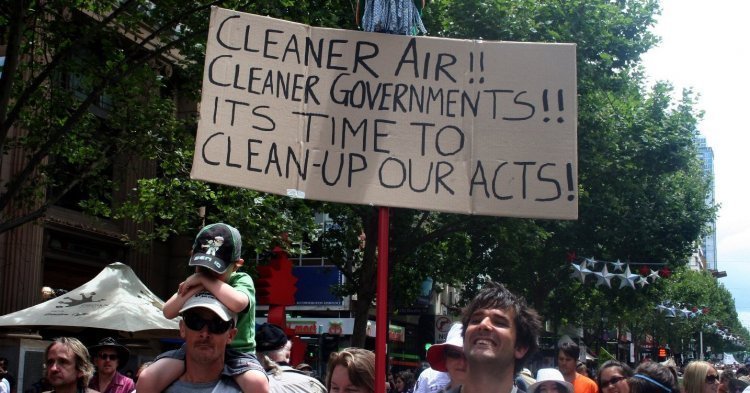While we have been faced with a systemic crisis for more than a decade, it is high time to take up new ways of thinking that combine protecting both the environment and democracy. The neoliberal economic system and unregulated globalisation are destroying environment and social ties. In this frenzy of change and internationalisation of trade that advances at all costs, more and more people feel abandoned and are more likely to vote for populists and the extreme-right, which is a great danger to democratic institutions and civil society in general.
Yet; like the saying ‘sound body, sound mind’ (anima sana in corpore sano), democracy can only be robust if society’s natural environment is also healthy. Damaging the environment could, in fact, lead to violations of human and civil rights.
Protecting the environment and promoting citizenship are therefore joined by the same principle of protecting the ‘common good’, the environment is everyone’s place to live, and democracy is everyone’s political structure. In this time of systemic crisis and where climate catastrophism has a tendency to paralyse people, it is important that civil society, as well as the political sphere, faces the threats on democracy and the environment together, like the way two legs on a human body work together in harmony.
The threat of ‘carbon-populism’ in Europe
The least we can say is that the political sphere isn’t ready to tackle these problems. Or worse, that an anti-democracy and an anti-environmentalist wave of nationalism is spreading over many countries around the globe. As Jean-Baptiste Fressoz reminded us in his article of 7th October in Libération, Donald Trump, Rodrigo Duterte, Scott Morrison and now Jair Bolsonaro are all attacking both democratic principles and protection of the environment, prompting fears of the rise of ‘carbon-fascism’ on a global scale never seen before.
Here in Europe, we have long thought we were safe from authoritarian and climate threats. The EU is supposed to provide a framework to guarantee democracy and a healthy environment. Yet this is becoming less and less true. The Polish government are destroying Polish democracy and their environment, as far as the large Bialowieza forest is concerned; in Germany, the AfD party (Alternative für Deutschland/Alternative for Germany) is very pro-coal and sceptical of anthropogenic climate-change; in the UK, Brexit is synonymous with relaunching fracking. Even in Europe, the extreme-right and populist parties are a true climate disaster as well as being disastrous for democracy and citizenship.
Strength in numbers, and young people’s determination
If the political ‘limb’ cannot act effectively when confronted with problems that affect democracy and the environment, the second civil ‘limb’ must take the reins. Civil society absolutely must realise that there is a clear link between defending democracy and the environment. Political discourse aims to dramatise the consequences of climate change to communicate that there is no feasible alternative to neoliberal capitalism, but this only leads to collective apathy. Nevertheless, many initiatives are being developed to raise awareness of democratic and environmental issues, to create connections between the two.
This is the case for Youth Forum COP, a not-for-profit organisation created in Brussels by a student initiative. One of its founders, Nathan Stranart, put this project together on the basis of two factors: the rising threat of anthropogenic global warming and the need for as many young people as possible to tackle questions about climate and debate them. The Youth Forum COP will take the form of discussion forums where many different ideas will be debated following the same procedure as a ‘classic’ COP (Conference of Parties, such as the 2015 Paris Climate Change Conference - COP 21).
A final document will then be created, entirely drafted by the young people participating, which will be sent to the relevant authorities to maximise the forum’s impact. More than raising awareness about climate issues and citizenship by speaking publicly and debating, the Youth Forum COP intends to give the floor to young people in the most inclusive and democratic way possible, in order to carry the most weight in political decisions. The challenge will be to finance the initiative, (even though it is supported by a panel of experts, by the COP Belgian delegation as well as other organisations), and effective communication to spread the word about the initiative; via social networks but also with ‘ambassadors’.
The discussion forums will not be the only places where change can be brought about; the streets and public spaces are all the more important since ‘democracy’ means ‘power of the people’, and ‘citizenship’ comes from ‘civitas’ which means ‘freedom of the city’, and also ‘agora’ which refers to a social and political assembly space in ancient Greece. In France, the resignation of the Minister for Ecological and Inclusive Transition, Nicolas Hulot, was a nasty shock for a party that had organised peaceful demonstrations: ‘climate marches’.
For Quentin Guilmois, organiser of the Toulouse Climate March on 8th September, the strength of the climate movement is that it brings together many generations, yet the presence of young people is especially important. The challenge for the people’s movement to resolve climate issues, who express themselves in the streets, is to ensure the movement’s continuation and to prevent it from losing momentum. In Libération, Nicolas Haeringer, from the organisation 350.org, sees in the national success of these marches a real ‘tidal wave’ of citizenship and democracy, that seeks to overthrow neoliberalism in its current form, incompatible as it is with democracy, community and environmentalism.
Citizenship, defending the environment, and the ticking clock
The initiatives promoting citizenship and defending the environment as well as the fight against climate change appear promising, as a growing part of society becomes aware of the dangers of authoritarian trends and ecological crisis. The big question is, is that enough? Without resorting to the sort of catastrophism derided above, it seems time is running out, that climate catastrophe is imminent, and that democracy is increasingly on the defensive. Two different dynamics are emerging: one the rise of carbon-populism, even in Europe, a real danger for society and biodiversity (despite ecological movements’ modest gains on a local level in places like Bavaria, Luxembourg and Brussels).
The other is the growing scope of citizen movements that defend democracy and the environment like two sides of the same coin. Eventually, the masses and young people’s determination should be able to force the political sphere to follow the beat, like two legs walking in sync, but time is running out to persuade them. Hence how incredibly important it is to act now and to remain hopeful about the collective ability to take action.
Europe is especially affected by this change of mindset. Climate change currently only has devastating effects in Africa or in Asia, whereas weakening democracy can be seen throughout Europe. The EU must realise that a healthy environment and protected biodiversity is an essential bedrock for democracy’s longevity and strength since one cannot survive without the other.



Follow the comments: |
|
